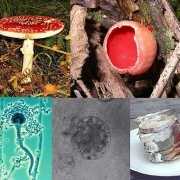Grain Stored Outside Could be a Risk This Spring
Last fall’s problem finding places to store bumper crops was a great one to have. But this spring, livestock producers may have a potentially serious problem on their hands if grain stored outside through the fall and winter begins to mold and produce mycotoxins. As warmer weather heats those stored piles of grain, producers should be prepared to look for and test their grain before feeding it to livestock.
Although there are thousands of fungi species, only 20 of them are capable of producing mycotoxins. Most mycotoxins affecting livestock are found in stored grains, especially high moisture corn, silage, cottonseed, peanuts, and to some extent, soybeans.
Mycotoxins are secondary metabolic products of fungi and some can cause serious health problems to animals as well as humans. Different mycotoxins can have different effects, but the consequences are almost always dangerous. Weight changes, reduced fertility, digestive problems, respiratory distress, suppressed immune response, disease resistance and even death have been attributed to mycotoxins.
Ingestion of feed containing mycotoxins can lead to liver damage, lesions and gangrene. Young pigs and breeding animals are especially susceptible to mycotoxins, says Mark Boggess, director of animal science for the Pork Checkoff says in a release. The most common mycotoxins in corn are aflatoxin, fumonisin, zearalenone and vomitoxin; however, there are others that may be a problem in specific regions of the country, Boggess says.
“Aflatoxin is the most serious of the mycotoxins but other mycotoxins can result in significant production losses,” he notes. “Producers have the option of testing their grain or feed for mycotoxins. If the maximum allowable limits are exceeded, they can dilute the grain or feed to tolerable limits or discard the material completely,” Boggess says.
Producers should be aware that even though fungal growth occurs, mycotoxins are not necessarily present. A “black light” can be used to detect the presence of mold growth on grain and is satisfactory for use as an initial test for aflatoxin, a known carcinogen.
This method checks only for the presence of mold growth, however, and even a positive test doesn’t mean that a toxin is present. Culturing mold or isolation of specific molds from feeds means nothing. The specific toxin must be isolated and/or its toxicity must be demonstrated, writes Clell V. Bagley, Utah State University Extension veterinarian in the Beef Cattle Handbook.
Livestock and grain producers may contact their local Extension service for more information regarding mycotoxin testing, specific risks, warning signs and treatments for using feed with mycotoxins. The government appears to identify the health risks and be more concerned about the link between animals and mycotoxins than that of human exposure to the same elements.

 ©Nathan Ballentine
©Nathan Ballentine 

 ©Wikipedia.com
©Wikipedia.com 



